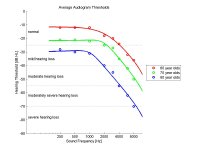TheOctopus
Banned
- Joined
- Apr 4, 2013
- Messages
- 1,622
- Thread Author
- #1
Now, I know we all rely on our "ears" to judge the outcome of such things as comparison of cables, components, speakers, etc...
We are often left with no other choice as "science" and the "audio world" do not always walk hand in hand and we know that all too well.
When science fails to offer a measurable difference in cables, when amplifiers measure the same, different power cords measure the same... We still claim to hear a substantial difference and the difference, or that which is immeasurable at this point, must be an elusive, mystical and perhaps quantum level phenomena.
Surely we have to have confidence in our "ears" or our hobby would be sort of pointless as far as chasing cables, isolation tweaks and other gadgets and gizmos go.
But... if some of the audiophiles are not musicians (much like many musicians are not audiophiles) could our ears be as good or perhaps better than a trained musician?
Many of us have heard the wonderful and almost mystical sound of a Stradivarius or Guarneri violin. Some claim they can never be duplicated. They cost upwards of $8M dollars. The sound is sublime.
Surely then professional musicians and specifically pro violin players should be able to hear a difference between a Stradivarius and a new violin while blindfolded?
Turns out that is not the case at all. I found that very surprising. https://www.newscientist.com/articl...spot-stradivarius-in-blind-test/#.U0QrXK2wJi5
So who thinks the "Audiophile Ear" is different from a "Professional Musican Ear" and could there be a difference?
We are often left with no other choice as "science" and the "audio world" do not always walk hand in hand and we know that all too well.
When science fails to offer a measurable difference in cables, when amplifiers measure the same, different power cords measure the same... We still claim to hear a substantial difference and the difference, or that which is immeasurable at this point, must be an elusive, mystical and perhaps quantum level phenomena.
Surely we have to have confidence in our "ears" or our hobby would be sort of pointless as far as chasing cables, isolation tweaks and other gadgets and gizmos go.
But... if some of the audiophiles are not musicians (much like many musicians are not audiophiles) could our ears be as good or perhaps better than a trained musician?
Many of us have heard the wonderful and almost mystical sound of a Stradivarius or Guarneri violin. Some claim they can never be duplicated. They cost upwards of $8M dollars. The sound is sublime.
Surely then professional musicians and specifically pro violin players should be able to hear a difference between a Stradivarius and a new violin while blindfolded?
Turns out that is not the case at all. I found that very surprising. https://www.newscientist.com/articl...spot-stradivarius-in-blind-test/#.U0QrXK2wJi5
So who thinks the "Audiophile Ear" is different from a "Professional Musican Ear" and could there be a difference?

